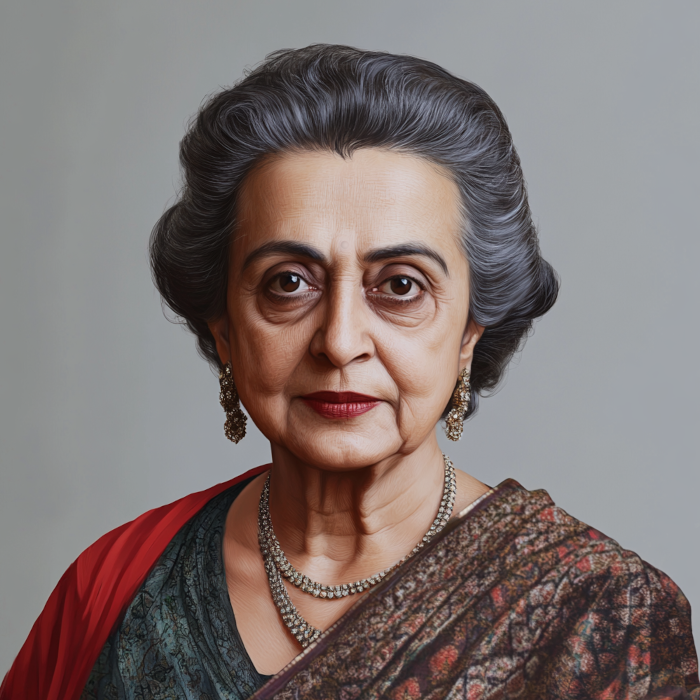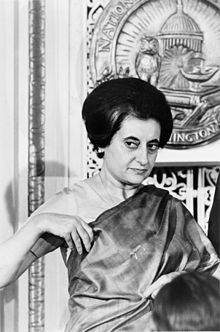


Indira Gandhi (1917–1984) was an Indian politician and the first and only female Prime Minister of India. She was the daughter of Jawaharlal Nehru, India's first Prime Minister, and one of the most significant political figures of the 20th century. Indira Gandhi served as Prime Minister from 1966 to 1977 and again from 1980 until her assassination in 1984. Her leadership was marked by bold economic and political policies, significant challenges, including conflicts, and a highly controversial period known as the Emergency. She was known for her centralizing authority and her role in shaping India's political landscape.
Birth and Family Background: Indira Priyadarshini Gandhi was born on November 19, 1917, in Allahabad, in British India. She was the only child of Jawaharlal Nehru and Kamala Nehru. Born into one of India’s most influential political families, Indira grew up in the environment of India's struggle for independence. Her early exposure to her father's political activities and the nationalist movement shaped her commitment to India's independence.
Education: Indira Gandhi was educated in India, Switzerland, and England. She attended Visva-Bharati University in Santiniketan, founded by Rabindranath Tagore, and later studied at Oxford University. Her education in Europe exposed her to diverse cultures and political ideologies. During her time in England, she actively engaged with Indian students and political leaders in the independence movement.
Marriage and Family Life: In 1942, she married Feroze Gandhi, a fellow member of the Indian independence movement. They had two sons, Rajiv Gandhi and Sanjay Gandhi. Feroze Gandhi later became a prominent member of the Indian National Congress and served as a Member of Parliament. However, the couple lived apart for much of their married life due to political and personal differences.
Involvement in the Freedom Struggle: Indira Gandhi was involved in the Quit India Movement of 1942, a mass protest demanding an end to British rule in India, led by Mahatma Gandhi. She was briefly imprisoned by the British authorities for her role in the movement. After India's independence in 1947, she worked closely with her father, Prime Minister Jawaharlal Nehru, and played an important role in the Congress Party, managing party affairs and acting as her father’s confidante.
President of the Indian National Congress (1959): In 1959, Indira Gandhi was elected President of the Indian National Congress. Although this was largely a ceremonial role, it signaled her growing influence within the party. After Nehru's death in 1964, Indira Gandhi was appointed Minister of Information and Broadcasting in the government of Lal Bahadur Shastri, where she became known for her efforts to promote modern media and expand public broadcasting.
Becoming Prime Minister: After the sudden death of Prime Minister Lal Bahadur Shastri in 1966, Indira Gandhi was chosen as his successor by the Congress Party leadership. Initially seen as a "compromise candidate" by senior party leaders, she soon emerged as a formidable leader with a strong political vision. She was sworn in as Prime Minister on January 24, 1966.
Economic and Social Reforms: During her first term, Indira Gandhi pursued policies aimed at economic self-sufficiency and social equality. She introduced several important reforms, including the nationalization of banks in 1969 to increase financial inclusion and the abolition of privy purses for the erstwhile princely states. Her "Garibi Hatao" (Remove Poverty) campaign, launched during the 1971 elections, resonated with the poor and helped consolidate her support among the rural masses.
Green Revolution: Indira Gandhi played a key role in launching the Green Revolution in India, a series of initiatives aimed at increasing agricultural production through modern farming techniques and high-yielding crop varieties. The Green Revolution helped India become self-sufficient in food production, reducing its dependence on food imports.
1971 Bangladesh Liberation War: One of the most notable achievements of her tenure was her leadership during the 1971 Bangladesh Liberation War. India supported the Bangladeshi independence movement against Pakistan, and after the Pakistani military crackdown in East Pakistan, which led to a humanitarian crisis with millions of refugees entering India, Gandhi decided to intervene militarily. The war resulted in the creation of Bangladesh in December 1971, and India emerged as a major regional power in South Asia. Her decisive handling of the crisis earned her significant international acclaim.
1974 Nuclear Test: In 1974, India conducted its first successful nuclear test at Pokhran, known as "Smiling Buddha," making India a nuclear power. The test demonstrated India's technological capabilities and was a significant milestone in India's quest for security and self-reliance, but it also drew criticism from several countries.
Declaration of Emergency: In June 1975, the Allahabad High Court found Indira Gandhi guilty of electoral malpractice and disqualified her from holding public office for six years. Faced with growing political unrest, protests led by Jayaprakash Narayan, and challenges from the opposition, Indira Gandhi responded by declaring a state of Emergency on June 25, 1975, citing internal security threats. During the Emergency, civil liberties were suspended, political opponents were arrested, press censorship was imposed, and the government assumed sweeping powers.
Impact of the Emergency: The Emergency period (1975–1977) is widely regarded as one of the most controversial phases of Indira Gandhi’s leadership. While it allowed her to implement several economic and social reforms, such as slum clearance and forced sterilization as part of family planning programs, the suspension of democratic rights and political repression led to widespread criticism. The use of authoritarian measures damaged her reputation and eroded public trust in her government.
End of the Emergency and Defeat in 1977: In 1977, Indira Gandhi lifted the Emergency and called for general elections. The Congress Party suffered a massive defeat, and the Janata Party, a coalition of opposition groups united against Gandhi’s rule, came to power. This marked the first time the Congress Party lost control of the central government since independence, and Gandhi herself lost her parliamentary seat.
Return to Power: After the Janata Party government fell apart due to internal conflicts, Indira Gandhi made a political comeback in the 1980 general elections, winning a decisive victory. She was sworn in as Prime Minister for the second time on January 14, 1980. During her second term, she sought to restore stability and focus on economic growth.
Operation Blue Star (1984): Indira Gandhi faced rising separatist movements during her second term, particularly in the Punjab region, where the Khalistan movement called for an independent Sikh state. In June 1984, she ordered Operation Blue Star, a military operation aimed at removing militant Sikh separatists from the Golden Temple in Amritsar, which had become a base for militant activity led by Jarnail Singh Bhindranwale. The operation caused significant damage to the temple, one of Sikhism's holiest sites, and resulted in numerous casualties, including civilians. The operation deeply hurt Sikh sentiments and created resentment among the Sikh community.
A Strong Leader: Indira Gandhi was known for her iron will and her ability to make bold and often controversial decisions. She centralized power and took an assertive stance in both domestic and foreign policies. Her leadership during the 1971 war, the nationalization of banks, and the nuclear test showcased her resolve to make India a powerful and self-reliant nation.
Economic and Social Policies: Indira Gandhi's economic policies focused on poverty alleviation, social welfare, and state control of key sectors. Her slogan "Garibi Hatao" resonated with the masses and helped establish her image as a champion of the poor. The nationalization of banks was aimed at expanding financial services to the rural population and marginalized sections of society. However, critics argue that some of her policies led to economic inefficiencies and bureaucratic control, which hindered economic growth.
Controversial Legacy of the Emergency: The Emergency remains one of the most controversial aspects of Indira Gandhi’s career. It exposed her willingness to use authoritarian measures to stay in power, leading to the suspension of democratic rights and political freedoms. The arrests of political opponents, censorship of the press, and forced sterilizations during the Emergency left a lasting impact on India's democratic institutions and tarnished her legacy.
Position on Secularism and Unity: Indira Gandhi was a staunch advocate of secularism and national unity. She fought against separatist movements in Punjab, Kashmir, and other parts of India. However, her use of military force, such as in Operation Blue Star, was criticized for its impact on communal harmony. Her commitment to national unity sometimes led her to make decisions that had unintended consequences, including the alienation of specific communities.
Influence on Indian Politics: Indira Gandhi's political style and charisma made her one of the most influential leaders in Indian history. Her ability to connect with the masses and her centralized style of governance transformed the Indian National Congress into a party centered around her leadership. Her legacy continued through her family, as both her sons, Rajiv Gandhi and Sanjay Gandhi, played significant roles in Indian politics. Her grandson, Rahul Gandhi, and granddaughter-in-law, Sonia Gandhi, have also been prominent figures in the Congress Party.
Women's Leadership: As the first and only female Prime Minister of India, Indira Gandhi broke gender barriers in Indian politics and served as an inspiration to women across the country. Her leadership demonstrated that women could occupy the highest positions of power in a male-dominated society.
Indira Gandhi was one of the most complex and influential leaders in Indian history. Her tenure as Prime Minister was marked by significant achievements, such as the liberation of Bangladesh and the Green Revolution, which helped India achieve self-sufficiency in food production. She displayed remarkable courage and determination in her leadership, earning her the nickname "Iron Lady of India."
However, her rule was also marked by controversial actions, particularly the Emergency and Operation Blue Star, which led to widespread criticism and backlash. Her legacy is a mixture of admiration for her leadership and achievements, as well as criticism for her authoritarian tendencies and the impact of her decisions on democratic institutions.
Indira Gandhi's impact on India’s political and social landscape was profound, and her legacy continues to shape Indian politics to this day. Her life was a testament to her resilience, her dedication to her vision of a strong and united India, and her willingness to take bold and sometimes drastic measures to achieve her goals.

We use cookies
We use cookies and other tracking technologies to improve your browsing experience on our website, to show you personalized content and targeted ads, to analyze our website traffic, and to understand where our visitors are coming from. Privacy Policy.